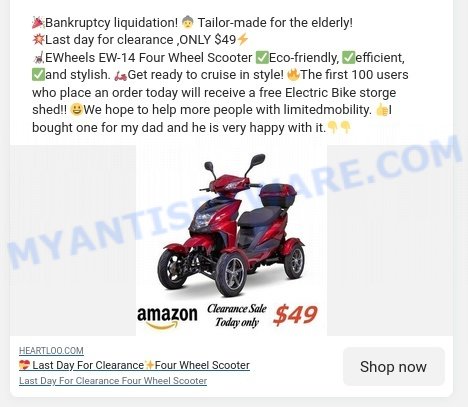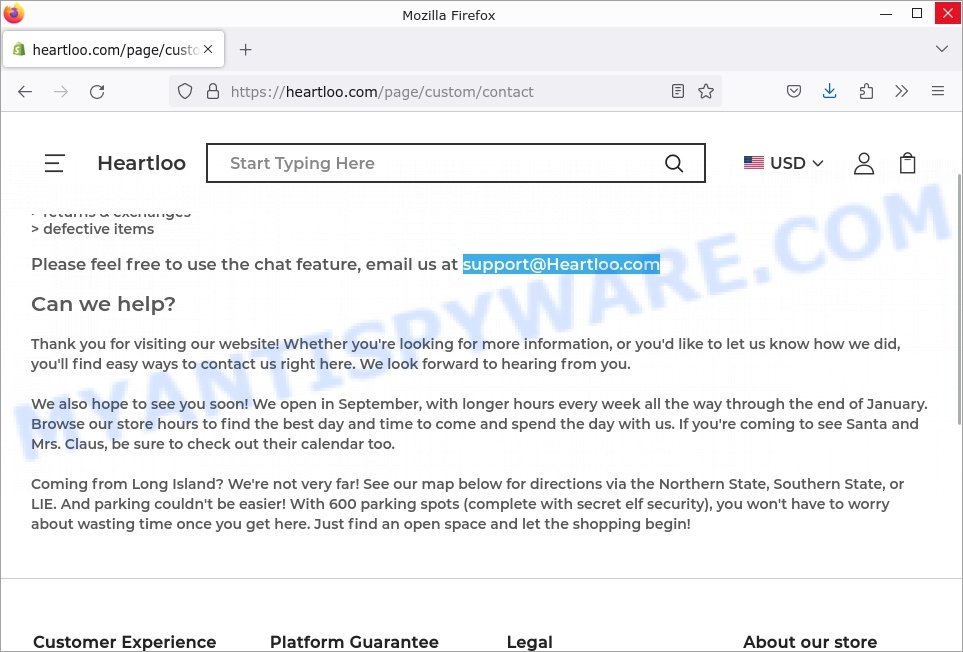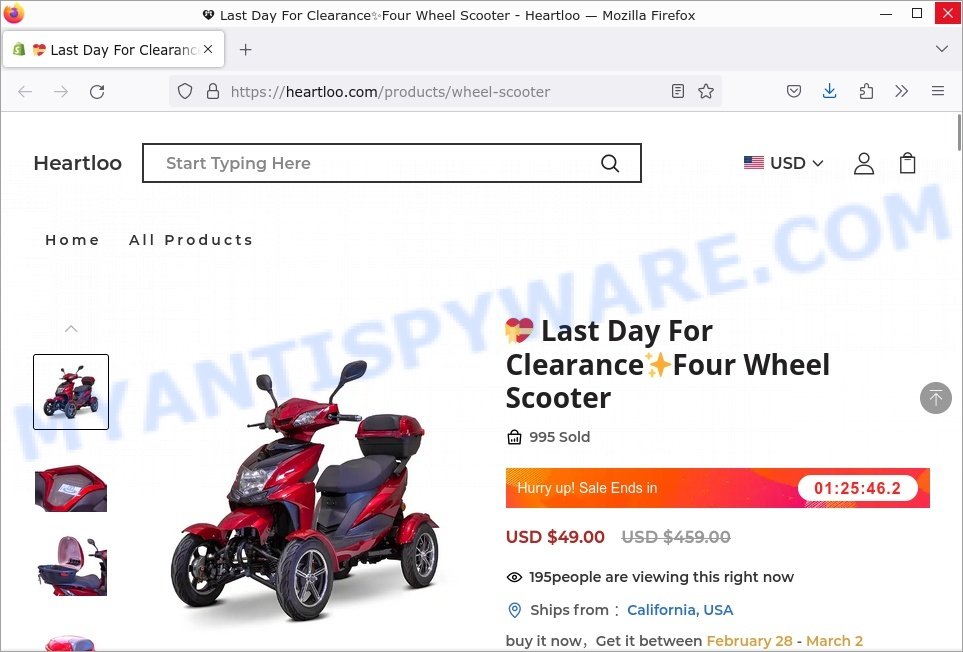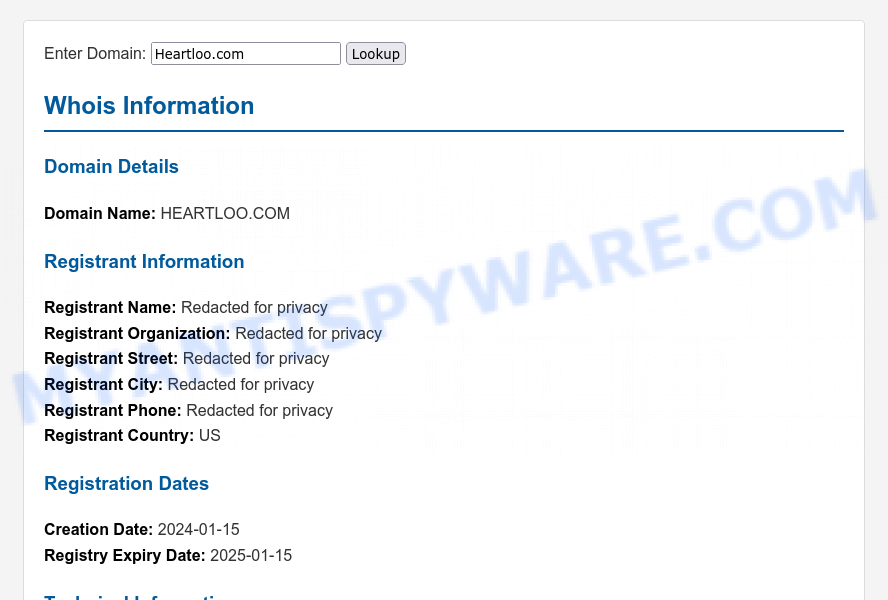Heartloo.com is a fraudulent online store masquerading as an Amazon Clearance Sale, specifically targeting the elderly with the promise of heavy discounts on mobility aids like the EWheels EW-14 Four Wheel Scooter. The site misleadingly uses the Amazon logo, along with similar images and text styles, to deceive customers into believing it’s affiliated with the legitimate retail giant. Additionally, the template used by Heartloo.com has been linked to other scam operations, further raising suspicions about its legitimacy.
The Facebook ads for Heartloo.com claim a “Bankruptcy liquidation” event, offering the scooters at just $49 and promising a free Electric Bike storage shed for the first 100 orders placed. Such offers, coupled with fabricated testimonials like “I bought one for my dad and he is very happy with it,” are designed to lure unsuspecting buyers.
However, several red flags indicate Heartloo.com is not trustworthy. The lack of concrete contact information, such as a phone number, company address, and the use of a generic email address (support@Heartloo.com), are concerning. Moreover, the domain was only created on January 15, 2024, and the registrant’s details are hidden, common traits among scam websites.
This article aims to dissect the Heartloo.com scam, highlighting the deceptive tactics used and the red flags to be aware of. We will also provide guidance on how to protect yourself from such scams and ensure safe online shopping.
Table of Contents
🚨 Is Heartloo.com a Scam? Beware!
Yes, Heartloo.com is a scam, and we have several signs to prove it. Below, we’ll list these clear indicators to help you stay safe. Understanding these signs is crucial for protecting your personal and financial information.
🚩 Suspicious Domain Name (Heartloo.com)
The domain name Heartloo.com may seem random and unrelated to the products being sold, lacking professionalism and trustworthiness. Scam sites often opt for unconventional names to avoid detection.
❌ Unauthorized Use of Brands (Amazon Logo, Texts)
The unauthorized use of the Amazon logo, images, and texts on the website indicates a lack of legitimacy and a potential intention to deceive customers. Scammers often exploit well-known brands to appear credible.
🛑 Template Linked to Other Scams
A website template associated with past scam sites suggests a pattern of deceptive behavior. These templates are frequently reused by fraudulent entities to quickly launch new illegitimate stores.
📢 Deceptive Facebook Ads
The Facebook ads promoting bankruptcy liquidation and tailored products for the elderly with unrealistically low prices are typical strategies used by scam stores to lure unsuspecting customers.
📆 Urgency Tactics (Last Day For Clearance, Today Only)
Phrases like “Last Day For Clearance” and “Today Only” create a false sense of urgency, pushing customers to make hasty decisions. Scammers often use these tactics to pressure individuals into purchasing quickly.
🔍 Lack of Company Contact Information
The absence of a phone number, physical address, or detailed company information raises concerns about the legitimacy and credibility of the store. Authentic businesses typically provide transparent contact details.
🔒 Limited Whois Information
The redacted registrant information and lack of specific contact details in the Whois data indicate a lack of transparency and accountability, common characteristics of fraudulent websites.
💸 Unrealistic Offers and Discounts
Advertising a Four Wheel Scooter for $49 and offering free Electric Bike storage sheds to the first 100 customers are overly generous deals that are too good to be true. Scam stores often use such unrealistic promotions to attract victims.
🛑 Overly Positive Customer Testimonials
Customer testimonials praising the products excessively and without specifics, such as “I bought one for my dad and he is very happy with it”, are often fabricated to create a false sense of credibility. Scammers use fake positive reviews to deceive visitors.
⏳ Abnormal Domain Creation and Expiry Dates
The creation date of January 15, 2024, and the expiry date of January 15, 2025, may indicate a recently established website with a short lifespan, a common trait of scam stores aiming to disappear quickly after deceiving customers.
Summary Table: Heartloo.com Review
{{SUMMARYTABLE}}
What to Do If Scammed 🚨
If you get scammed while shopping online, it’s important to act fast. Here’s what you can do:
🛑 Stop Further Transactions
The first step is to halt any additional transactions that might be in process. Contact your bank or credit card provider and inform them that you’ve fallen victim to a scam. They can help by blocking the card or reversing any unauthorized transactions.
📞 Report the Fraud
File a report with your local police and provide all the available evidence, such as screenshots, emails, and website URLs. Additionally, report the scam to online portals like the Better Business Bureau (BBB) at www.bbb.org or the Federal Trade Commission (FTC) at reportfraud.ftc.gov. If you’re in another country, reach out to your national consumer protection agency.
💻 Take Screenshots
Before the scam website gets taken down or changes, make sure to capture screenshots of your transactions and communications. These can serve as evidence if you decide to pursue legal action.
⚖️ Consult Legal Advice
Speak to a legal advisor about your situation. While pursuing legal action may be time-consuming and costly, it could be a possible avenue for recovering your lost money.
📢 Share Your Experience
Use social media platforms to share your experience and warn others about the scam. Your story could prevent someone else from falling victim to the same or similar scams.
🚫 Conclusion: Don’t Get Tricked!
{{CONCLUSION}}



















